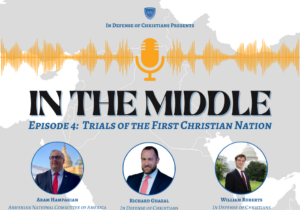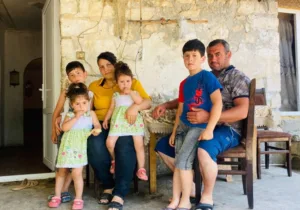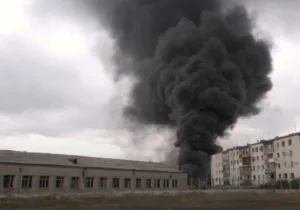The majority of the ethnic Armenians who once lived in the Armenian enclave of Nagorno-Karabakh within Azerbaijan, representing 25 percent to 30 percent of Azerbaijan’s Christian population, fled their ancestral homes in September and sought refuge in Armenian lands that remain out of Azerbaijani hands. This tiny region in the South Caucasus, measuring only 1,700 square miles, has quickly become a significant strategic battlefield with implications not only for the future of a Christian minority that faced genocide under the Ottomans, but also for the complicated web of alliances that ties Azerbaijan and Armenia to Iran, Russia, Turkey, Israel, and the United States.
The region has long been disputed. Under the Soviet Union, Nagorno-Karabakh, also known as Artsakh, was geographically within the Soviet Socialist Republic (SSR) of Azerbaijan, but was also an autonomous oblast with its own governing structure. Following the dissolution of the Soviet Union and independence of several former SSRs, the mostly ethnically Armenian population of Nagorno-Karabakh voted to formally join newly independent Armenia. The First First Nagorno-Karabakh War, which lasted from 1988-1994, resulted in the de facto independence of Nagorno-Karabakh as the Republic of Artsakh from Azerbaijan and unification with the rest of Armenia, though this territorial change was never internationally recognized.
The Second Nagorno-Karabakh War, which lasted only from September to November of 2020, saw Azerbaijan take back much of the territory it lost 30 years ago. However, rather than a total recapture of Nagorno-Karabakh, Armenia and Azerbaijan agreed to a Russian-brokered ceasefire that kept the status of Artsakh in limbo. Artsakh remained de facto independent, but cut off the rest of Armenia, only accessible via a small area called the Lachin Corridor where Russian peacekeepers would be stationed. This effectively led to a siege/stalemate of Artsakh’s Armenian inhabitants for most of 2023.
Then, on September 19th, Azerbaijan launched a military offensive against the Republic of Artsakh. This region, which is surrounded by Azerbaijan, was once home to approximately 150,000 people who practice the Armenian Apostolic faith, Armenia being the first nation to formally adopt Christianity in 301. Following the conflict, about 100,000 predominantly Armenian Christian refugees have hastily departed for Armenia. Today, Stepanakert — once the largest city in Nagorno-Karabakh — is an abandoned ghost town. Armenian Prime Minister Nikol Pashinyan has described Azerbaijan’s recurring threats against Armenians, including the recent invasion of Nagorno-Karabakh, as “ethnic cleansing” and “a crime against humanity.”
The Azerbaijan takeover of Nagorno-Karabakh and the resulting exodus of Christians from the region carry significant global political implications. Armenia, once part of the Soviet Union, shifted its post-Soviet allegiance closer to Russia than to Europe, viewing Russia as its protector, particularly against Azerbaijan, a predominantly Islamic nation. Russia was among the first countries to officially recognize the Armenian genocide, which occurred in 1915 at the hands of the Ottoman Turks. Since 1994, Armenia has been a member of the Collective Security Treaty Organization (CSTO), a military alliance comprising six post-Soviet states led by Russia. However, in May this year, Prime Minister Nikol Pashinyan publicly expressed that he was considering withdrawing Armenia from CSTO due to Russia’s perceived failure to protect Armenia and Nagorno-Karabakh.
Pashinyan told a press conference, “Multiple cases of terror against the Armenian population of Nagorno-Karabakh, illegal blocking of the Lachin Corridor, and Azerbaijan’s September 19 attack against Nagorno-Karabakh, have raised serious questions about goals and motives of the Russian Federation’s peacekeeping contingent in Nagorno-Karabakh.”
In a tragic historical twist, Azerbaijan’s military employed weaponry sourced from Turkey, the descendants of those responsible for the Armenian genocide. Other Azerbaijani armaments were purchased from Israel, a nation whose own population has experienced genocide. Both the European Union and the United States have called for sanctions against Azerbaijan. Concurrently, the U.S. is imposing sanctions on Turkish entities which have supported Russia’s war in Ukraine. Simultaneously, the U.S. and EU are contemplating sanctions against Azerbaijan due to its support for Russia’s gas exports. The American Enterprise Institute is additionally advocating for sanctions on Israeli arms exporters for their role in supplying weapons to Azerbaijan.
The Azerbaijan-Israel relationship is intricate and multifaceted. Israeli weapons shipped to Azerbaijan include advanced Harop precision drones and missile interceptor systems. In return, Azerbaijan plays a crucial role in meeting 40 percent of Israel’s energy requirements. Despite Azerbaijan’s predominantly Muslim population, both nations share a common opposition to Iran. Their intelligence services have collaborated to facilitate Israel’s spying on Iran.
Jerusalem is particularly concerned about Tehran’s support for Hamas and Hezbollah, which pose a direct threat to Israel’s very existence. At the same time, Azerbaijan’s government in Baku is concerned that the Iranian military has conducted frequent military exercises near the Azerbaijani border, simulating potential invasion scenarios. Tehran, in an ironic turn, blames Israel for influencing Baku’s stance against Iran. The Saudi Arabia-Iran peace agreement, negotiated by China, was perceived as altering the regional balance in the Middle East, threatening the interests of both Azerbaijan and Israel. As a result, Baku and Jerusalem have found themselves on the same side, standing against Iran. But now, both are on the wrong side, standing against Armenia, and neither recognizes the 1915 genocide of Armenians.
In 2021, the U.S. officially recognized the Armenian genocide, paving the way for improved diplomatic relations with the Armenian government in Yerevan. Just a week before the conflict erupted in Nagorno-Karabakh, Armenian and U.S. military forces carried out their first-ever joint training exercises. Furthermore, in response to an influx of refugees into Armenia, the nation’s parliament boldly defied Russia and decided to become a member of the International Criminal Court, which has issued an arrest warrant for Vladimir Putin.
The ultimate outcome of Azerbaijan’s takeover of Nagorno-Karabakh could potentially lead to Armenia aligning more with Europe, strengthening its alliance with the U.S. This shift may reduce Russia’s influence as it loses an ally. Simultaneously, Azerbaijan may find itself drifting further from the West. Nevertheless, both Israel and Azerbaijan will inadvertently continue to serve U.S. interests by countering Iran. From a religious perspective, the exodus of Christians from Azerbaijan is part of a broader trend of Christians leaving Muslim-majority regions. Turkey, for instance, has witnessed a drastic decline in its Christian population from 20 percent to just 1 percent over the past century. In Iraq, 80 percent of Christians have left within the last two decades, reducing their presence to a mere 2 percent of the population. Over the past decade, Syria has seen a 50 percent decrease in its Christian population. Lebanon, which once had a Christian majority, is now 35 percent Christian. In the Holy Land, the Palestinian Christian community has been reduced to just 1 percent.






 Sponsor a student for Christianity & National Security 2024
Sponsor a student for Christianity & National Security 2024